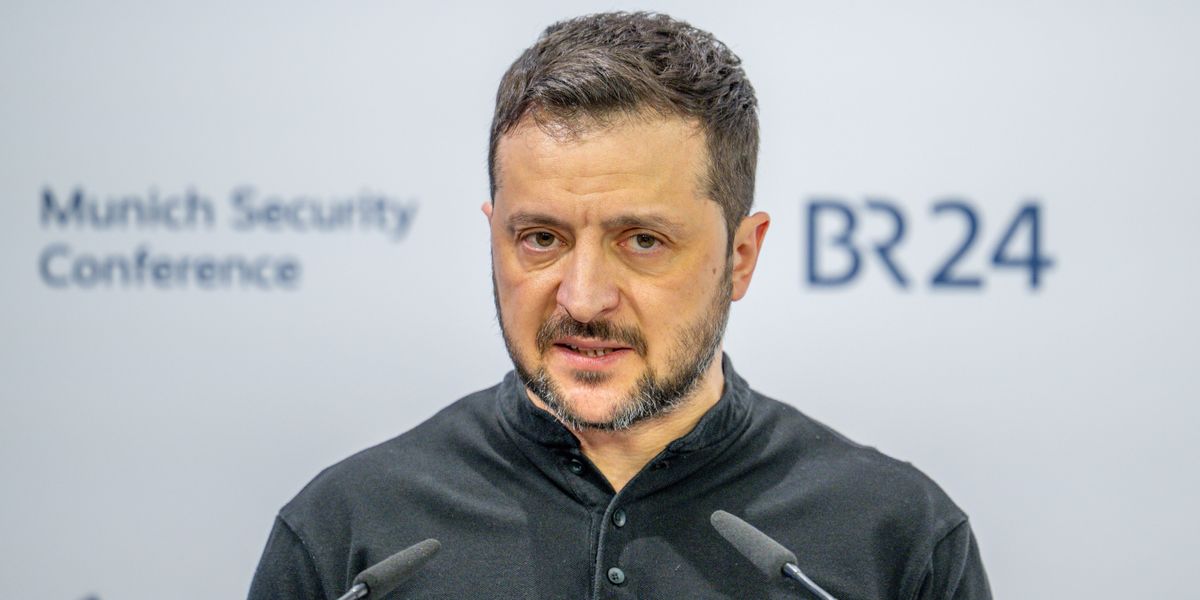MUNICH, GERMANY — During his keynote speech at the Munich Security Conference today Ukrainian President Volodymr Zelensky repeated the need for a “European army” — also framed as “an Army of Europe.”
What this specifically means is unclear, but the Ukrainian leader delivered the message home, if we are to judge by the headlines of the main European newspapers this afternoon. Zelensky tried to further raise the stakes by saying that Ukraine has intelligence that next summer Russia plans to send troops to Belarus. On that, he noted: “Is this Russian force in Belarus meant to attack Ukraine? Maybe, or maybe not. Or maybe it's meant for you. Let me remind you, Belarus borders 3 NATO countries.”
Zelensky walked a tight line between not directly antagonizing the United States and making clear to European leaders that the continent’s security is up to them, not Washington and that they might very well be left alone.
“Let's be honest, now we can't rule out the possibility that America might say no to Europe on issues that threaten it,” he pointed out. Similarly, Zelensky asked: “Does America need Europe as a market? Yes, but as an ally? I don't know. For the answer to be yes, Europe needs a single voice, not a dozen different ones.”
Ret. Gen. Keith Kellogg, Donald Trump’s special envoy for Ukraine, at first appeared to have brought some clarity on some of the open questions regarding Europe’s role in future peace talks. Asked about whether Europe would be present at the planned talks, Kellogg said he was from “the school of realism, and that is not going to happen.” Later on, in a panel discussion, he was far less clear. It is also uncertain to which extent Kellogg is directly speaking for the White House, and European officials appear somewhat at a loss when seeking to tell apart Washington’s main messages to Europe from simple background noise.
Regardless of which course events take, there seems to be a lot of challenges facing NATO Secretary-General Mark Rutte, who has a reputation of knowing how to approach U.S. President Donald Trump. On Saturday, before Kellogg commented on Europe being off the negotiation table, Rutte seemed to know or guess where things might be going and positioned himself as the bridge between the European and the American pillars of NATO.
In a panel discussion, Rutte said: “To my European friends, I would say: get into the debate, not by complaining that you might, yes or no, be at the table, but by coming up with concrete proposals, ideas, ramp up [defense] spending.”
Before Zelensky’s address, German Chancellor Olaf Scholz opened the day in what was most likely his last speech at the international meeting. Although he is running for re-election in Germany’s national elections next weekend, his center-left Social-Democratic Party (SPD) is trailing by 15 points in the polls the conservative Christian Democratic Union and its sister party, the Christian Social Union (CDU/CSU). Scholz has indicated he will retire from politics if he does not remain chancellor.
At the beginning of his speech, and in a reference to Vance’s address to the conference yesterday, Scholz said Germany will not accept people who “intervene in our democracy,” adding that “where our democracy goes from here is for us to decide.”Scholz then moved on to discuss how to fund increasing defense expenditures in Germany. Last November, the issue played a major role in the collapse of the German ruling coalition, made of Scholz’s SPD, the Greens, and the pro-business Free Democratic Party (FDP). The latter party pushed for cuts in social programs rather than taking new public debt (the option favored by the SPD and the Greens) to increase the military budget.
When Scholz fired FDP leader and then Finance Minister Christian Lindner from the government, the ruling coalition lost its parliamentary majority, leading to the early elections to take place next weekend. Regarding the future of Ukraine, Scholz remarked that “there will only be peace if the sovereignty of Ukraine is assured, a dictated peace would therefore never get our support.” He added that “we will also not accept any solution that leads to decoupling European and American security.”
- Munich Dispatch: Vance lectures Euros on democracy & tolerance ›
- Hegseth finally pops bubble of illusion: 'No NATO for Ukraine' ›
- Munich Dispatch: Gaza issue banished to the sidelines this year | Responsible Statecraft ›
- Paris Summit was theater, and much ado about nothing | Responsible Statecraft ›
- Lindsey Graham just won't give up the Ukraine-NATO ghost | Responsible Statecraft ›
- Ukraine War at 3: The victory we demanded and the attrition we got | Responsible Statecraft ›
- Why this 'megaphone diplomacy' isn’t helpful | Responsible Statecraft ›
- Hard truths about the Trump-Zelensky-Vance Oval Office blow-up | Responsible Statecraft ›
- Europe pushing delusional US-style rearmament plan | Responsible Statecraft ›















